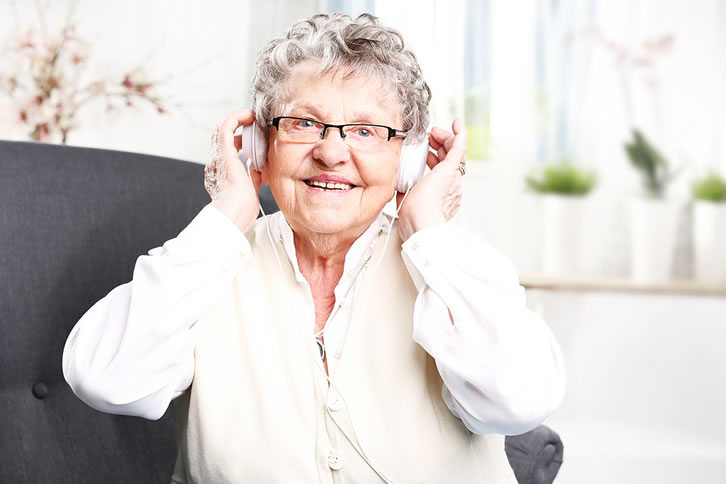
How to Plan Music Activities for Dementia Care
Found In: ›Activities ›Music ›Articles ›One-on-One ›Alzheimer's & Dementia ›Reminiscing

Golden Carers has 1000s of activities and resources for senior care.
Everyone responds instinctively to music. A person’s ability to engage in music often remains intact far into the advanced stages of dementia.
Research into music and brain function has revealed that music triggers certain networks of the brain that benefit people who have difficulty with language, cognition, or motor control.
What is Music Therapy?
Music therapy is a research-based practice and profession in which music is used to actively support people as they strive to improve their health, functioning and well-being.
Music Therapy is commonly used as an intervention for people living with dementia to reduce agitated behavior and improve communication.
In the absence of a Music Therapist, you can still successfully incorporate music activities into your activity programs. Regular music sessions with familiar music is a wonderful way to positively influence mood and behavior.
Related: Music Activities for Seniors
Music Therapy for Dementia
Music lights up the entire brain. Music Therapy can give people with dementia a break from confusion and fear. Some people can no longer remember their loved ones, but they still know all the words to their favorite songs.
Music Therapy may even in some instances provide relief from pain and help people recover lost memories.
Who can Benefit from an Individual Music Activity Session?
Everyone can benefit from music activities! Regardless of genre, listening to music of your preference releases endorphins in the brain and may reduce anxiety, relieve depression and boost the immune system among other benefits.
You may offer individual music sessions to:
- Physically frail elderly clients who are functionally dependent
- People living with dementia or Alzheimer’s Disease
- People with Aphasia and Agnosia disorders
- People with perceived or real lack of autonomy
- People living with chronic illnesses: cancer, heart disease, arthritis, Parkinson's
- People suffering from stress, anxiety, and/or depression
Related: 15 Uplifting Activities for People Confined to Bed
The Objectives of a Music Activity Session
Music sessions should be designed to comfort, entertain and positively influence the lives of residents in long term care. It is important to establish objectives for Individual Music sessions to provide you with direction and assist in establishing whether the session is working.
Here are a few ideas for objectives:
- Improve social behaviour
- Enhance communication
- Entertain and comfort
- Alleviate isolation and withdrawal
- Diminish agitation
- Awaken special memories associated with happy phases of life
- Improve mood
- Soothe feelings of sadness and sorrow (which may be felt deeply but unexpressed)
Related: Social Isolation: How to Support Your Clients
Types of Music Activity Sessions
Music sessions can be Receptive or Active.
Receptive sessions are when the individual listens to live or recorded music of his/her preference.
Active sessions are when the individual participates by singing or playing a melodic or rhythmic musical instrument; or both.
It is important to keep in mind that music triggers emotions from the past and that responses to these emotions can be good and sometimes painful. Be prepared to support, empathize and console people with sorrowful responses.
How to Run an Individual Music Session

A music session should evoke memories and create meaningful experiences for the individual. It should engage people emotionally, bring joy and validate feelings.
Here are some tips for getting the most out of an Individual Music Activity:
- The location of the session should be familiar to the person; their bedroom is often ideal for an undisturbed and serene setting.
- Use ‘live’ music if you have the resources. Various musical instruments can be used: flute, portable keyboard, ukulele, violin, or accordion.
- If using recorded music it should be chosen according to the individual’s preferences.
- Start session by asking the person which song she/he would like to hear.
- Try to engage the person by asking them what the song reminds them of. The resident should be encouraged to reminisce and sing-along with you.
- Sing the song and leave a few words at the end for the client to finish.
- If the person has difficulty singing try humming or la-laing.
- The duration of an individual music session should be around 30 minutes long as a rule of thumb (more if response is positive).
- Run sessions once a week or more, depending on time available.
- At the end of each session take notes and report your observations in your Progress Notes.
Related: Free Music Playlists for the Elderly - Hits from the 40s, 50s and 60s
Other Useful Tips:
- If your client is unwell, offer to make a mixed CD with their favorite songs to listen to when you are not around. You can find music online and songs are not expensive, some as little as $1 dollar each. This can be a powerful gift for someone who has little time left. Ipods with personalized playlists are also a wonderful investment.
- If interaction is not possible due to medical diagnosis use to the same process of talking to the resident and explaining what you are playing next. You may be surprised at the shift in alertness and eye contact in some clients when the music is heard. If you get that sort of reaction you have achieved one of your goals.
- If you work with residents from a non-English background you may use folkloric music from their country. Hum the melody and observe resident's response.
Individual Music Activities for people living with Alzheimer’s
Even those living with advanced stages of dementia benefit from singing sessions. A singing session is engaging and simple to run. According to several studies, when spoken language does not seem to reach a person, music can function as a go-between by activating memory and emotions.
- You may start the session with “Let's reminisce together!” and proceed to sing a well-known song from yesteryear.
- When music preferences cannot be established, choose popular music from the time the individual was between 15 to 35 years old.
- Offer props as necessary: drums, maracas, cymbals, rhythm sticks, recorder, and keyboard; also use photos, posters, magazines.
- Keep on singing/playing music and wait patiently for a response. If no response is received don’t assume it didn’t work; come back the following week and try again.
- Share the session with the individual’s relatives if appropriate
- After each song, observe individual’s
- Alertness,
- Eye contact
- Smiles
- Nuances in body language
- Mood changes
- Engagement with activity director/family
- Duration of sessions should be approximately half an hour.
- Take notes and report your observations in your Progress Notes.
Related: Musical Bingo and Group Singalong
Music can help reach the unreachable
People living with dementia can be transformed by music. Incorporating music activities into your weekly activity program is well worth the effort.
Related: Music Activities for the Elderly
We'd love to hear your feedback!
What has been your experience with music therapy for the elderly?
Related Activities
Comments Post a Comment
 12th Sep 2022
12th Sep 2022
We have a mixed bunch, from some in the early stages of dementia right through to a more advanced stage. And a sprinkling of residents who are cognitively OK.
We intend to introduce various percussion instruments this time around. I would be grateful for any ideas or advice about this as I have never used them myself.
Thanks in advance.
 8th Mar 2021
Diversional Therapist
8th Mar 2021
Diversional Therapist
The session may last 15 or 30 minutes - depending on how engaged participants are. There is also Body Percussion for cognitive stimulation. Body Percussion is making rhythmic patterns with the sounds of your body: clapping, stumping, finger drumming. Again the facilitator sits in front of a group and claps, stumps, to the sound of music. Choose the music that makes people want to move e.g. The Lion Sleeps Tonight’ or ‘The Pink Panther Theme”. Here are a couple of links that may help you start a Drum Circle or Body Percussion.
https://www.goldencarers.com/drum-circle-activity-for-the-elderly/5032/
https://www.youtube.com/watch?v=lk75qDst8wE&ab_channel=ChristosDelasito
 3rd Oct 2018
Retired Music Therapist
3rd Oct 2018
Retired Music Therapist
 8th Oct 2018
8th Oct 2018
 20th Oct 2016
20th Oct 2016
 17th Oct 2018
Retired Music Therapist
17th Oct 2018
Retired Music Therapist

 24th May 2016
24th May 2016

 24th May 2016
Music therapist
24th May 2016
Music therapist
 26th Mar 2021
Music Therapist
26th Mar 2021
Music Therapist

 2nd Dec 2012
Diversional Therapist
2nd Dec 2012
Diversional Therapist
 2nd Dec 2012
recreation therapist
2nd Dec 2012
recreation therapist

 Karaoke Happy Hour
Karaoke Happy Hour
 Teaching Songwriting Ingredients
Teaching Songwriting Ingredients
 Max Bygraves - Finish the Song Titles
Max Bygraves - Finish the Song Titles
 Birthday Celebration Song
Birthday Celebration Song

